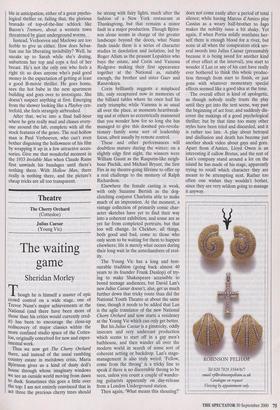Theatre
The Cherry Orchard (Cottesloe) Julius Caesar (Young Vic)
The waiting game
Sheridan Morley
Though he is himself a master of epic crowd control on a wide stage, one of Trevor Nunn's major achievements at the National (and there have been more of those than his critics would currently cred- it) has been to encourage the close-up rediscovery of major classics within the more confined studio space of the Cottes- loe, originally conceived for new and exper- imental work.
Thus we now get The Cherry Orchard there, and instead of the usual rambling country estate in meltdown crisis, Maria Bjornson gives us a kind of dusty doll's house through whose imaginary windows we see an outside world moving from dawn to dusk. Sometimes this goes a little over the top: I am not entirely convinced that in act three the precious cherry trees should be strung with fairy lights, much after the fashion of a New York restaurant at Thanksgiving, but that remains a minor fault in a major production. Though Bjorn- son alone seems in charge of the greater landscape beyond the doors, what Nunn finds inside them is a series of character studies in desolation and isolation, led by Roger Allam as the peasant Lopakhin who buys the estate, and Corin and Vanessa Redgrave making their first appearance together at the National as, suitably enough, the brother and sister Gaev and Ranevskaya.
Corin brilliantly suggests a misplaced life, only recaptured now in memories of the billiard tables where he once had his early triumphs; while Vanessa is as usual all over the place, at moments heartbreak- ing and at others so eccentrically mannered that you wonder how for so long she has managed to give this doomed pre-revolu- tionary family some sort of leadership focus, albeit usually by remote control.
These and other performances will doubtless mature during the winter; on a slightly edgy first night, the winners were William Gaunt as the Rasputin-like neigh- bour Pischik, and Michael Bryant, the first Firs in my theatre-going lifetime to offer up a real challenge to the memory of Ralph Richardson.
Elsewhere the female casting is weak, with only Suzanne Bertish as the dog- clutching conjuror Charlotta able to make much of an impression. At the moment, a vintage collection of primarily comic char- acter sketches have yet to find their way into a coherent exhibition, and some are as yet far from completed portraits, but that too will change. In Chekhov, all things, both good and bad, come to those who only seem to be waiting for them to happen elsewhere; life is merely what occurs during their long wait in the antechambers of real- ity.
The Young Vic has a long and hon- ourable tradition (going back almost 40 years to its founder Frank Dunlop) of try- ing to make Shakespeare accessible to bored teenage audiences, but David Lan's new Julius Caesar doesn't, alas, get us much further down that tricky route than did the National Youth Theatre at about the same time, though it needs to be added that Lan is the agile translator of the new National Cherry Orchard and now starts a residency at the Young Vic which can only get better.
But his Julius Caesar is a gimmicky, oddly insecure and very undercast production which seems to start off in a gay men's bathhouse, and then wander all over the modem world in search of some sort of coherent setting or backdrop. Lan's stage- management is also truly weird; 'Fellow, come from the throng' is a tricky line to speak if there is no discernible throng to be seen, unless you count a couple of wander- ing guitarists apparently on day-release from a London Underground station.
Then again, 'What means this shouting?' does not come easily after a period of total silence; while having Marcus d'Amico play Cassius as a weary half-brother to Iago makes the nobility issue a bit shaky. Yet again, if when Portia mildly mutilates her- self there is enough blood for a river, but none at all when the conspirators stick sev- eral swords into Julius Caesar (presumably because it is being saved for another kind of river effect at the interval), you start to wonder if Lan or any of his cast have really ever bothered to think this whole produc- tion through from start to finish, or just gone with whatever momentary special effects seemed like a good idea at the time.
The overall effect is kind of apologetic, as though nobody really trusts the play until they get into the tent scene, way past the beginning of act four, and suddenly dis- cover the makings of a good psychological thriller; but by that time too many other styles have been tried and discarded, and it is rather too late. A play about betrayal and disillusion and death has become just another shock video about gays and gore. Apart from d'Amico, Lloyd Owen is an interesting if callow Brutus, and the rest of Lan's company stand around a lot on the island he has made of his stage, apparently trying to recall which character they are meant to be attempting next. Rather too often one wishes they wouldn't bother, since they are very seldom going to manage it anyway.


























































































 Previous page
Previous page